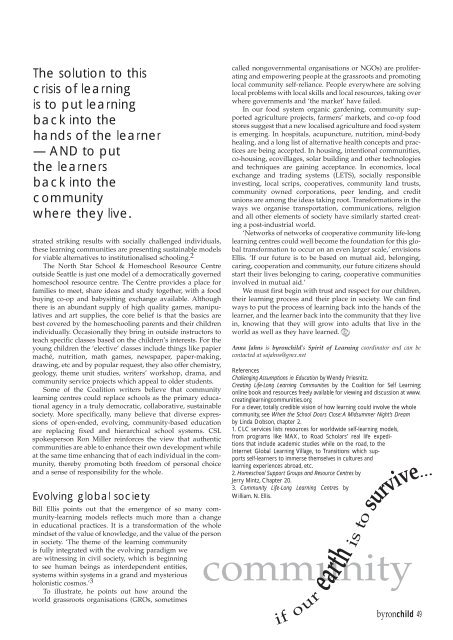byronchild - logo
byronchild - logo
byronchild - logo
You also want an ePaper? Increase the reach of your titles
YUMPU automatically turns print PDFs into web optimized ePapers that Google loves.
The solution to this<br />
crisis of learning<br />
is to put learning<br />
back into the<br />
hands of the learner<br />
— AND to put<br />
the learners<br />
back into the<br />
community<br />
where they live.<br />
strated striking results with socially challenged individuals,<br />
these learning communities are presenting sustainable models<br />
for viable alternatives to institutionalised schooling. 2<br />
The North Star School & Homeschool Resource Centre<br />
outside Seattle is just one model of a democratically governed<br />
homeschool resource centre. The Centre provides a place for<br />
families to meet, share ideas and study together, with a food<br />
buying co-op and babysitting exchange available. Although<br />
there is an abundant supply of high quality games, manipulatives<br />
and art supplies, the core belief is that the basics are<br />
best covered by the homeschooling parents and their children<br />
individually. Occasionally they bring in outside instructors to<br />
teach specific classes based on the children’s interests. For the<br />
young children the ‘elective’ classes include things like papier<br />
maché, nutrition, math games, newspaper, paper-making,<br />
drawing, etc and by popular request, they also offer chemistry,<br />
geology, theme unit studies, writers’ workshop, drama, and<br />
community service projects which appeal to older students.<br />
Some of the Coalition writers believe that community<br />
learning centres could replace schools as the primary educational<br />
agency in a truly democratic, collaborative, sustainable<br />
society. More specifically, many believe that diverse expressions<br />
of open-ended, evolving, community-based education<br />
are replacing fixed and hierarchical school systems. CSL<br />
spokesperson Ron Miller reinforces the view that authentic<br />
communities are able to enhance their own development while<br />
at the same time enhancing that of each individual in the community,<br />
thereby promoting both freedom of personal choice<br />
and a sense of responsibility for the whole.<br />
Evolving global society<br />
called nongovernmental organisations or NGOs) are proliferating<br />
and empowering people at the grassroots and promoting<br />
local community self-reliance. People everywhere are solving<br />
local problems with local skills and local resources, taking over<br />
where governments and ‘the market’ have failed.<br />
In our food system organic gardening, community supported<br />
agriculture projects, farmers’ markets, and co-op food<br />
stores suggest that a new localised agriculture and food system<br />
is emerging. In hospitals, acupuncture, nutrition, mind-body<br />
healing, and a long list of alternative health concepts and practices<br />
are being accepted. In housing, intentional communities,<br />
co-housing, ecovillages, solar building and other technologies<br />
and techniques are gaining acceptance. In economics, local<br />
exchange and trading systems (LETS), socially responsible<br />
investing, local scrips, cooperatives, community land trusts,<br />
community owned corporations, peer lending, and credit<br />
unions are among the ideas taking root. Transformations in the<br />
ways we organise transportation, communications, religion<br />
and all other elements of society have similarly started creating<br />
a post-industrial world.<br />
‘Networks of networks of cooperative community life-long<br />
learning centres could well become the foundation for this global<br />
transformation to occur on an even larger scale,’ envisions<br />
Ellis. ‘If our future is to be based on mutual aid, belonging,<br />
caring, cooperation and community, our future citizens should<br />
start their lives belonging to caring, cooperative communities<br />
involved in mutual aid.’<br />
We must first begin with trust and respect for our children,<br />
their learning process and their place in society. We can find<br />
ways to put the process of learning back into the hands of the<br />
learner, and the learner back into the community that they live<br />
in, knowing that they will grow into adults that live in the<br />
world as well as they have learned.<br />
Anna Jahns is <strong>byronchild</strong>’s Spirit of Learning coordinator and can be<br />
contacted at sajahns@gmx.net<br />
References<br />
Challenging Assumptions in Education by Wendy Priesnitz.<br />
Creating Life-Long Learning Communities by the Coalition for Self Learning;<br />
online book and resources freely available for viewing and discussion at www.<br />
creatinglearningcommunities.org<br />
For a clever, totally credible vision of how learning could involve the whole<br />
community, see When the School Doors Close: A Midsummer Night’s Dream<br />
by Linda Dobson, chapter 2.<br />
1. CLC services lists resources for worldwide self-learning models,<br />
from programs like MAX, to Road Scholars’ real life expeditions<br />
that include academic studies while on the road, to the<br />
Internet Global Learning Village, to Transitions which supports<br />
self-learners to immerse themselves in cultures and<br />
learning experiences abroad, etc.<br />
2. Homeschool Support Groups and Resource Centres by<br />
Jerry Mintz, Chapter 20.<br />
3. Community Life-Long Learning Centres by<br />
William. N. Ellis.<br />
Bill Ellis points out that the emergence of so many community-learning<br />
models reflects much more than a change<br />
in educational practices. It is a transformation of the whole<br />
mindset of the value of knowledge, and the value of the person<br />
in society. ‘The theme of the learning community<br />
is fully integrated with the evolving paradigm we<br />
are witnessing in civil society, which is beginning<br />
to see human beings as interdependent entities,<br />
systems within systems in a grand and mysterious<br />
holonistic cosmos.’ 3 community<br />
To illustrate, he points out how around the<br />
world grassroots organisations (GROs, sometimes<br />
<strong>byronchild</strong> 49<br />
if our earth is to survive...


